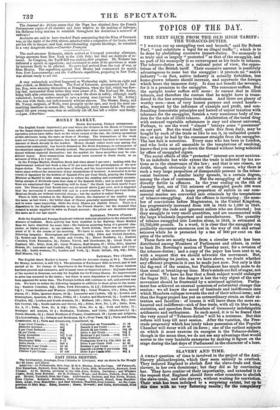TOPICS OF THE DAY.
THE NEXT SLICE FROM THE OLD HIGH TARIFF: THE TOBACCO-DUTIES.
" I WOULD cut up smuggling root and branch," said Sir Robert Peel, " and substitute a legal for an illegal traffic " ; which is to be done by abolishing excessive import-duties. No monopoly is so truly and so largely " protected " as that of the smuggler, and no part of his monopoly is so extravag-ant as his trade in tobacco. The tobacco-duties are, in a rational point of view, the oppro- brium of the British tariff. Their excessive amount is positively advantageous to none but the smuggler : it protects no " native industry "—in fact, native industry is actually forbidden, lest home-grown tobacco should increase, and supersede the foreign which bears the immense duty. It does not benefit the revenue; for it is a premium to the smuggler. The consumer suffers. But the upright trader suffers still more : he cannot deal in illicit tobacco, and therefore the custom that he might have is trans- ferred to the less scrupulous tradesman. And there are plenty of worthy men—men of very honest purpose and sound hearts— who, warped by the influence of example and profit, and con- founding democratic principles and hatred of unjust taxation with tolerance for the smuggler, furnish a very numerous body of tra- ders for the sale of illicit tobacco. Adulteration of the taxed drug with untaxed vegetable substances is easy and almost universal. Perhaps, to use the word " almost" betrays some " greenness" on our part. But the weed itself, quite free from duty, may be bought by such of the trade as like to use it, in unlimited quanti- ties ; or may be had by the consumer straight from the smuggler. The last fact is notorious. Every man who has been in London, and who looks at all amenable to the temptations of smoking, knows that you cannot go down the Strand without being solicited by offers of smuggled cigars.
The social effects of this "protected " interest are most noxious.
To an indefinite but wide extent the trade is infected by lax no- tions as to the observance of the law ; and that is one reason, no doubt, though obviously it is not the only reason, why there is such a very large proportion of disreputable persons in the tobac- conist business. A similar laxity spreads, to a certain degree, among the class of customers. But the smuggling of tobacco is directly fertile in offences. In the year ending on the 5th of January last, out of 755 seizures of smuggled goods 538 were seizures of tobacco. A large proportion of sailors in our com- mercial marine are converted into criminals by the temptations of tobacco-smuggling. And the offence is increasing : the num- ber of convictions before Magistrates, in the United Kingdom, has progressively increased from 528 in 1842 to 1,230 in 1845. It is chiefly the rude and ignorant sailors who are detected ; but they smuggle in very small quantities, and are unconnected with the large wholesale importers and manufacturers. The quantity of tobacco smuggled into London alone, in 1843, is estimated at 22,792,000. pounds. In a word, it is clear that the smuggler can profitably encounter enormous cost in the way of risk and actual seizures while he is protected by a tax of 900 per cent on the price of the article.
These facts are mostly taken from a circular which has been distributed among Members of Parliament and others, in order to back Dr. Bowring's motion of Tuesday next, for a revision of the tobacco-duties ; and a copy of the paper has been sent to us, with a request that we should advocate the movement. But, fully admitting its justice, as we have above, we doubt whether any efficient progress in it can be made just now. Not only is this the fag-end of the session, but Parliament has much more to do than usual at breaking-up time. Men's minds are full of sugar, not of tobacco. We have no fear that a fresh subject would endanger the Sugar Bill ; but the danger is lest the very object of the new movement should be frustrated by a mistimed agitation. Parlia- ment has achieved an unusual quantum of substantial change this session : we all know the mood of lassitude and indifference into which Members collapse towards the end of their school-term; and thus the Sugar project has put an extraordinary strain on their at- tention and faculties : of course it will leave them the more ex- hausted and indifferent—sick of free trade, with all its blue books, statistics, and speeches from Members of tiresomely indefatigable arithmetic and enthusiasm. In such mood, it is to be feared that the very sound of "Tobacco-duties" will be a nuisance. But this reform will keep till next session. After the vacation, the Free- trade propensity which has lately taken possession of the Popular Chamber will recur with all its force ; one of the earliest subjects on which it must exercise its energies is the Tobacco-duties though in the mean time, we do not see any advantage that would accrue to the very laudable enterprise by making it figure on the stage during the last days of Parliament in the character of a bore.


























 Previous page
Previous page